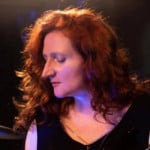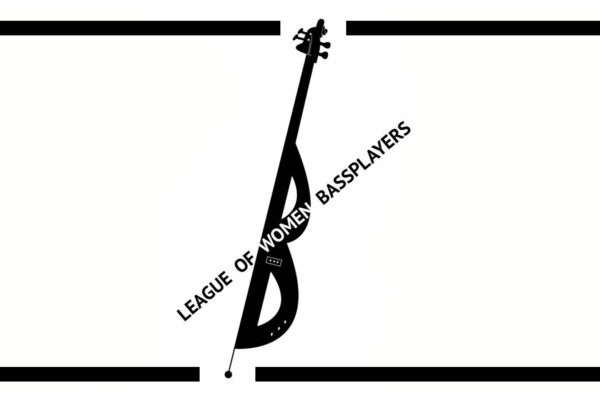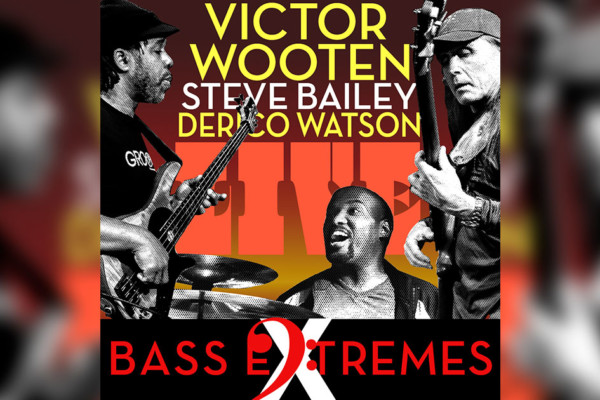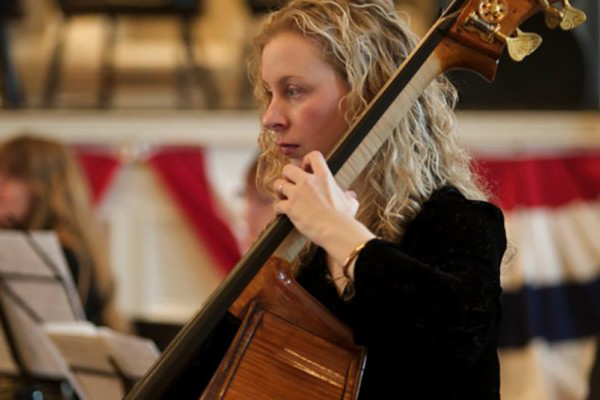Wonder Women: Jacqueline Pickett & Susan Hagen
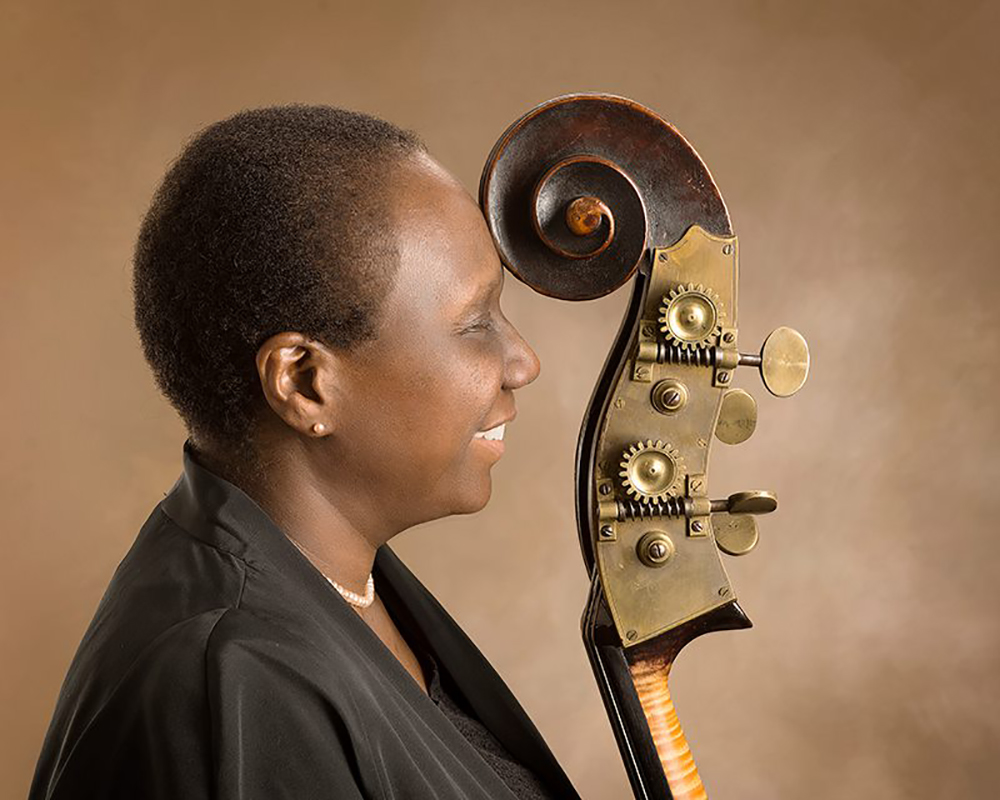
We’re kicking off a special two-part interview series with two Wonder Women of the Bass, Jacqueline Pickett (this month’s feature) and Susan Hagen (more on her next month!). We cover a lot of ground in these two interviews. Both women will talk about their backstories, their music, and the League of Women Bass Players’ upcoming inaugural conference from June 2nd – 5th 2022 (head to lowbinternational.org for more info or to register) and what the attendees could expect from that event.
The LOW B conference is open to both electric bassists and double bassists. The logo for the conference is a fusion of double bass and electric bass; a symbol of the diversity of players this conference hopes to serve.
The conference features a lineup of diverse presenters on a variety of topics. Here’s a quick cross-section of some of the talented bassists and builders involved in this event; Ariane Cap (Electric Bass: Theory and Method Books), Anna Huthmaker (All About Bass Bows), Brittany Frompovich (Building A Pedalboard for Beginners), Laura Payne (Electric Bass Basics), Elinore Morris (The World of Lutherie), Madalyn Sklar (Go Go Girls/Social Media Expert), Missy Raines (Bluegrass Bass), Susan Hagen (recitalist, Keynote speaker, Warm Up class) and many more. You’ll find a more complete list of presenters (as of the time of publication) at the end of this article.
Tell us about yourself.
I started playing bass at age eleven in a free program provided by our small town’s public school system. Our community did not have a lot of money, but they valued the arts. So they made sure children had access to a chorus, band, and orchestra. I enjoyed playing in the orchestra, and after four years of study, at age 15, I got the opportunity to play in the Johnstown (PA) Symphony. I took private lessons with Mr. Earnest Papinchak, the Principal Bass at Johnstown at the time. He really made Simandl – a book many students claim to be the most boring textbook ever written – seem like a lot of fun! I also worked at the local Mcdonald’s and with help from my mom, my aunts, and my uncles, I purchased my first electric and acoustic basses.
I got a full scholarship to study bass at West Virginia University and I spent all of my time studying. I had a wonderful teacher, Jeff Mangone, who instilled in me the joy of being versatile in playing different styles of music. I played in jazz combos and earned extra money playing in local orchestras and swing bands. I joined the local American Federation of Musicians. The local sponsored me to attend the Congress of Strings in the Summer of 1979 and 1980 in Cincinnati, Ohio. I had the opportunity to meet some wonderful bassists…some I still keep in touch with to this day…and there is where I met Mr. Paul Ellison and Mr. Barry Green. I was lucky to attend the 1980 Summer Bass Congress as a bassist in the American Federation of Musicians Congress of Strings program. I still remember the very first day when I saw Franco Petracci lead a masterclass on “semi and diatonic” thumb positions!
I got to see bassists from Europe and the United States, and I remember one particular bassist who was from France but seemed more like he was from the Middle East. I asked him if he would show me how to stand since he had a very unique approach to holding the instrument right in front of him as if he was standing with a cello. That bassist, Mr. Francois Rabbath, smiled and proceeded to show me how he stood. To this day, because of that experience, I both sit and stand because I am focused on balance, so it does not matter if you sit or stand …it matters that you are in balance.
I graduated from West Virginia with high honors and got my first job in a summer orchestra in Mexico City with the Mineria Symphony orchestra. That was truly a life-changing experience. I played there for the summers of 1982 through 85 and then again (as Principal Bass) in 1996 and 1997. The conductor of Mineria, Jorge Velazco, was friends with many members of the Berlin Philharmonic. I got to meet and get coaching from Klaus Stoll and that was truly amazing! I decided to go to graduate school when I was accepted into the Yale School of Music in the Fall of 1982. There I got the opportunity to study with Homer Mensch…who truly is a Mensch…he was the most wonderful teacher for me.
I worked with a production at Yale Rep called Ma Rainey’s Black Bottom. I was the recorded bass at the Broadway Production at the Court Theater. Mr. Mensch introduced me to Mr. Richard Davis, Bass Professor at the University of Wisconsin-Madison. Studying with Richard was one of the richest experiences of my life. He so well prepared me for the world of art I was settling into. I received an equal opportunity fellowship that covered all of my tuition. Again, I worked very hard and played in local orchestras and jazz combos to supplement my income. Upon completion of my course work in 1985, I moved to Chicago and studied with Mr. Warren Benfield and Mr. Steve Lester of the Chicago Symphony. I was starting my year as Principal bass with the Chicago Civic Orchestra when I got a call from the New York Music Assistance Fund to take an audition to play as an orchestra fellow with the Detroit Symphony. I played there for one season and won a position with the Jacksonville, Florida Symphony as a section bass. I continued to play jazz gigs on the side.
I was not happy as a full-time symphony musician. Also, I wanted to play the solos. I wanted to be the Principal Bassist. So, after a not so harmonious parting from Jacksonville (they non-renewed my contract for “artistic reasons”), I moved to Atlanta, Georgia. I am so grateful to Ralph and Gloria Jones. They introduced me to many of the contractors in the area and soon I was working in all of the local ensembles and playing a lot of club dates. I also won the position of Principal Bass with the Columbus (GA) Symphony, and I was where I wanted to be musically. All by age 28!
Now I wanted to find a way to bring balance to my art and justice and harmony in my environment and the general world around me. That meant changing myself yet again. This is when I started down the road to being an activist. I met Julius Levine at a local Audition for the Marlboro Music Festival, and I think he was impressed that I drove from Atlanta to New York to take lessons with him. He was such a humble man and such a genius in music and life in general. Priceless to know him. I did not get into Marlboro, but Mr. Levine did recommend me to audition for Tanglewood in 1991. I got in and even Ed Barker, who was our coach, said it was one of the best bass sections he worked with. I still remember his “wow” after I played the triplets in Leonore No.3 overture sectional rehearsal (funny how little things like that stick with you).
The entire bass section was invited back to Tanglewood for a second year. I got a full-time job as an Assistant Professor of Music at Auburn University and held that position from 1991 until 1996. I finished my dissertation and, with a Doctorate in hand, went for the higher paying job as a public school orchestra teacher in Atlanta. I made connections in Alabama; one of those connections was with Ms. Consuela Lee Moorhead. She ran a school in Snow Hill, Alabama. She taught kids in very challenging circumstances how to play improvised music and develop self-confidence. Her group of elementary and middle school children, called “Bright Glory” inspired me as well as jazz greats, Max Roach and Milt Jackson, who Consuela brought down to work with the children.
I also played in a jazz duo we called by our last names, the “Lee/Pickett” duo (two famous Confederate generals) and played concerts locally with the occasional gig out of town, but we were there to serve the community. I live in Atlanta now. I continue to present Master Classes and I have formed the LOW B (League of Women Bass Players), my second service-oriented non-profit. I’m the Principal Bass at Columbus (GA) Symphony, Principal Bass at the LaGrange (GA) Symphony Orchestra, and an Instructor at Spelman College.
What are you woodshedding right now?
- “Ethereal Trio” for viola, violoncello, and bass by Lisa Ragsdale.
- “If Trees Could Talk”, for violin and double bass, First movement by Amy Levanthal, Third movement by Karen Thompson.
- “Romeo Turn” for viola, violoncello, and double bass, by Errollyn Wallen.
- “Concerto Grosso” for violin, bass, and piano with string orchestra by Errollyn Wallen.
- “XOCHIPITZAUATL(Flor Menudita/Thin Flower)” for solo double bass, by Rodrigo Mata
- “Armando’s Rhumba” by Chick Corea
- ‘The Dance” Etude #10 by Xavier Foley
We usually hear about the downsides of being a female in the music industry. Let’s flip the script; do you see any benefits?
Yes! When people see someone like me…in a role that they usually do not see people like me…they are hopeful that they can see and be a part of the change too! That is by far the coolest script flip! The artists who are participating in LOW B are all about flipping the script…I think the attendees are about that too…that is why the conference opens with the introduction of the people who registered for the conference!
How are you handling working through the pandemic? How has technology helped (or hindered) you? Any tips to share?
Three things to focus on during a crisis or any other time:
- Keep spirits high
- Be Flexible
- Find ways to add Value to your environment.
I performed a lot of videos in 2020, and since I was a Principal player, I got back to work with the reduced orchestra format in 2021. I had to learn how to do online teaching…a new skill! Technology is neutral…one cannot like or hate something for being what it is. For me, it is not “what technology has hindered or helped but the flip of it…what can I do with technology and how can I use it to add value to my environment. For me, social media has enabled me to connect with people more quickly. The online conference platform has allowed newly started organizations to hold worldwide forums and see situations in the news in real-time.
What are your current projects that you can tell us about?
In April 2022, in addition to my concerts with the LaGrange and Columbus Symphonies, I will participate in the Gateways Festival 2022 New York tour with concerts at Eastman School of Music and Carnegie Hall. I will also play bass with the South Florida Symphony Orchestra, featuring Aaron Copland’s Clarinet Concerto with David Shifrin at concerts in Ft. Lauderdale and Miami. I will be playing a commission in June as part of The African American Composers Forum. And there are a couple of music festivals in Pennsylvania and Maine before returning to fall activities. And, of course…the inaugural LOW B conference!
What would you want to change about the music industry?
Integrity… but then it might not be itself if it had a different sense of integrity… you can’t change a dog from being a dog.
Who is a new artist (or new to you) that we should all know about?
Brittany Howard of Alabama Shakes…as a solo artist…Jasmine Album (I just recall that song was about her older sister, Jasmine, who died too soon. I had a younger sister who died too soon too)
An early experience that shaped you as an artist now?
The Church of God services near my home…hearing the music, my mother’s record collection.
You know bassists are all about the gear. And I’m definitely a gear nerd. So I have to ask…any recent game changing acquisitions to your toolkit?
I play both Fender Jazz and Precision Bass. I also play a Steinberger “iNSpiration” upright electric bass. They all use passive pickups. My amps are Bose L-1 for house concerts and for big bands I use the SWR redhead 2 10” speakers and a woofer.
What drew you to the music industry?
Felt like it was what I was meant to do on this planet..a calling.
What’s an average day like for you?
Nap or take a 14-hour sleep day. Catch up with important paperwork, grab something that I made to eat, poke around on the bass, take a walk outside, practice for one hour, and do some housework for two hours. I’ll watch the internet for the latest news, the music I am playing or just enjoy listening to. I might chat with a friend/family/or take business calls. I eat lunch, then practice for two hours. I’ll teach lessons, and go to a rehearsal. I try to go outside for a short walk, do computer work, then play the bass some more, and go to bed. If I don’t have an evening gig, I’ll cook a batch of food to make meals for several days. I want to get back to whitewater kayaking…my favorite outdoor sport. Calmer water these days.
What’s your favorite part about this line of work? Your least favorite part? Why?
I am so happy when I am playing the bass! Why? I love the spiritual connection when I play music. My least favorite; dealing with the fickle nature of our business. I feel bad for people who have to tow the party line for the institution they represent…that is really stressful at times
Where can we find you on the interwebs?
If you do a Google search for “Jacqueline Pickett, double bass” you will get some stuff that might be insightful. For more info about The League of Women Bass Player’s Inaugural Conference, head to lowbinternational.org.
For more info, go to the Spelman College website.
Here’s some of the LOW B presenters (as of the publication of this feature):
- Ariane Cap – Electric Bass: Theory and Method Books
- Anna Huthmaker – All About Bass Bows
- Brittany Frompovich – Building A Pedlaboard for Beginners
- Laura Payne – Electric Bass Basics
- Elinore Morris – The World of Lutherie
- Gwen Forrester – The World of Lutherie
- Anne Marie Runco – The World of Lutherie
- Hannah Mayne – The World of Lutherie
- Yumi Fujimoto – The World of Lutherie
- Jordan Davis – Starting Your Career
- Lisa Dowling – Music Therapy
- Heather Lardin – Baroque Bass
- Brianna Goldberg – All About Bass Bows
- Lynn Hannings – The World of Lutherie
- May Halyburton – Bessy Bass
- Marion Hayen – Constructing Jazz/Walking Bass Lines
- Lauren Hermas – Bass Back Issues
- Miranda Hill – Commissioning/Creating Artistic Legacies
- Antonella Mazza – Adventures of An Italian Bassist in Paris
- Nicole Melrose – Strings Rise Program
- Allara Briggs Pattison – Spirit of My Music
- Jen Paro – Electric Bass Basics
- Lauren Pierce – Interview with Bassist
- Mary Ann McSweeney – Doubling on Acoustic and Electric Bass
- Missy Raines – Bluegrass Bass
- Madalyn Sklar – Go Go Girls / Social Media Expert
- Kae Thompson – Voice Analysis
Brittany Frompovich is a highly regarded educator, clinician, blogger, and bassist who currently resides in the Washington DC/NOVA region. For more content from Brittany, check out her blog, her YouTube channel, and her Bandcamp site. She also offers handmade unisex music-themed jewelry through her Etsy store. Get a Wonder Woman Tee!
